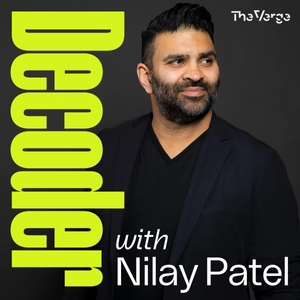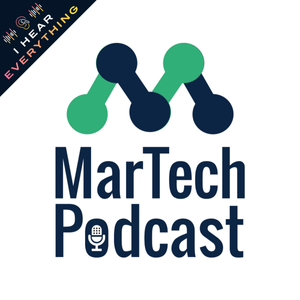
#19 - Eric Berger: Healthcare’s ‘we’re going to need a bigger boat’ moment
02/07/24 • 29 min
In this episode, Eric Berger sits down for an in-depth conversation with Dr. Aaron Neinstein, chief medical officer at Notable. Among other things, the two discuss:
How IT has become a strategic priority in healthcare
What ROI means in today’s business environment
What comes next for generative AI in healthcare
And much more.
—-
Eric Berger is a member of Bain’s Healthcare & Life Sciences and Private Equity practices with more than 10 years of consulting experience.
Eric advises clients across a range of industries, with a focus in private equity funds as well as healthcare payers and services and biotech / pharma. He has additional experience in industrial goods and services and consumer packaged goods.
He holds expertise in topics related to commercial due diligence, business unit strategy, operating model, organization design, pricing, brand strategy and mergers & acquisitions.
Prior to joining Bain in 2011, Eric worked for a small consulting firm in Boston focused on the pharmaceutical, biotech and medical device industries. Previously, he was a researcher in organic chemistry at Harvard University. Eric has published in Science and the Journal of the American Chemical Society and was awarded a grant from the Howard Hughes Medical Institute and the Jean Dreyfus Boissevain scholarship.
Eric earned an MBA from MIT Sloan School of Management. He holds a BA cum laude and MA in chemistry from Harvard University.
—-
Outline
Here are the timestamps for this episode.
(00:00) - Intro
(00:15) - The state of healthcare IT
(01:25) - Healthcare executives’ mindset today
(02:55) - Healthcare’s ‘new normal’ is here
(05:30) - IT is a strategic priority in healthcare
(07:40) - Competing priorities and feelings among the healthcare C-suite
(09:40) - The rapidly evolving role of the healthcare CIO
(10:50) - What ROI means in today’s environment
(12:35) - Healthcare executives are making technology investments in these key areas
(13:44) - Why patient experience and quality are significant priorities
(16:19) - Generative AI in healthcare - where are we now?
(18:43) - The leading vanguard of health systems using AI
(19:30) - Using Generative AI for healthcare’s unstructured data
(21:41) - From thinking about AI use cases to a focus on how AI impacts business strategy
(26:52) - What comes next for AI in healthcare?
(29:52) - End
Relevant links
Eric Berger on LinkedIn
Dr. Neinstein on LinkedIn and Twitter
Notable on LinkedIn
In this episode, Eric Berger sits down for an in-depth conversation with Dr. Aaron Neinstein, chief medical officer at Notable. Among other things, the two discuss:
How IT has become a strategic priority in healthcare
What ROI means in today’s business environment
What comes next for generative AI in healthcare
And much more.
—-
Eric Berger is a member of Bain’s Healthcare & Life Sciences and Private Equity practices with more than 10 years of consulting experience.
Eric advises clients across a range of industries, with a focus in private equity funds as well as healthcare payers and services and biotech / pharma. He has additional experience in industrial goods and services and consumer packaged goods.
He holds expertise in topics related to commercial due diligence, business unit strategy, operating model, organization design, pricing, brand strategy and mergers & acquisitions.
Prior to joining Bain in 2011, Eric worked for a small consulting firm in Boston focused on the pharmaceutical, biotech and medical device industries. Previously, he was a researcher in organic chemistry at Harvard University. Eric has published in Science and the Journal of the American Chemical Society and was awarded a grant from the Howard Hughes Medical Institute and the Jean Dreyfus Boissevain scholarship.
Eric earned an MBA from MIT Sloan School of Management. He holds a BA cum laude and MA in chemistry from Harvard University.
—-
Outline
Here are the timestamps for this episode.
(00:00) - Intro
(00:15) - The state of healthcare IT
(01:25) - Healthcare executives’ mindset today
(02:55) - Healthcare’s ‘new normal’ is here
(05:30) - IT is a strategic priority in healthcare
(07:40) - Competing priorities and feelings among the healthcare C-suite
(09:40) - The rapidly evolving role of the healthcare CIO
(10:50) - What ROI means in today’s environment
(12:35) - Healthcare executives are making technology investments in these key areas
(13:44) - Why patient experience and quality are significant priorities
(16:19) - Generative AI in healthcare - where are we now?
(18:43) - The leading vanguard of health systems using AI
(19:30) - Using Generative AI for healthcare’s unstructured data
(21:41) - From thinking about AI use cases to a focus on how AI impacts business strategy
(26:52) - What comes next for AI in healthcare?
(29:52) - End
Relevant links
Eric Berger on LinkedIn
Dr. Neinstein on LinkedIn and Twitter
Notable on LinkedIn
Previous Episode

#18 - Robert Wachter: the role of AI in healthcare's digital transformation
In this episode, Dr. Robert Wachter sits down for an in-depth conversation with Dr. Aaron Neinstein, chief medical officer at Notable. Among other things, the two discuss:
Why the latest AI innovations are a true game-changer for healthcare
What most healthcare organizations can learn from the Atlanta Braves
How to balance safety and benefits when it comes to AI
And much more.
—-
Dr. Robert M. Wachter is chair of the UCSF Department of Medicine, which leads the nation in grants from the National Institutes of Health and is consistently ranked as one of the nation’s best. His primary interests are health care quality, safety and policy. He coined the term hospitalist in 1996 and is widely credited as the founder and academic leader of the hospitalist specialty in medicine, the fastest-growing specialty in U.S. medical history.
Wachter is an international leader in health care safety and quality. He has published more than 250 articles and six books on health care topics, including Understanding Patient Safety, the world’s top-selling safety primer, now in its third edition. He is a frequent contributor to the New York Times and Wall Street Journal.
Wachter received his medical degree at the Perelman School of Medicine at the University of Pennsylvania. He completed a residency in internal medicine, serving as chief resident, at UCSF. He was a Robert Wood Johnson Foundation Clinical Scholar at Stanford University, and he studied patient safety in England in 2011 as a Fulbright Scholar.
—-
Outline
Here are the timestamps for this episode.
(00:00) - Intro
(01:24) - Your book Digital Doctor from 10 years ago - what did you get right and wrong?
(03:33) - Avoiding unintended consequences with digital in healthcare
(04:33) - How the industry is cautiously approaching GPT-4 and new AI innovations
(05:00) - The biggest opportunity in healthcare? Focusing on this area
(05:40) - How the Atlanta Braves compare to the average healthcare organization
(06:29) - Have GPT-4 and LLMs helped us move beyond the ‘AI winter?’
(10:19) - Why the latest AI innovations represent a step-change for healthcare
(11:43) - What problems in healthcare are most ripe for solving with AI?
(14:54) - Balancing safety and benefit as we think about AI in healthcare
(19:11) - What is top of mind as we head into 2024?
(22:24) - The future risk of AI complacency
(25:27) - End
Relevant links
Bob Wachter on LinkedIn
Bob Wachter on Twitter
Dr. Neinstein on LinkedIn and Twitter
Notable on LinkedIn
Next Episode

#20 - Erica DeBoer: Technology and the ongoing nursing shortage
In this episode, Erica DeBoer sits down for an in-depth conversation with Dr. Aaron Neinstein, chief medical officer at Notable. Among other things, the two discuss:
The impact of automation on patient registration and clinical intake
The role of AI in helping address challenges in nursing
How the next generation of nurses view the profession
And much more.
—-
Erica DeBoer, RN, MA, CCRN, CNL, serves as Sanford Health’s chief nursing officer. A member of the organization’s executive leadership team, DeBoer provides clinical expertise for Sanford Health’s work in quality, safety, research and care management. She also oversees the integration of clinical initiatives.
DeBoer has more than 20 years of experience as a front-line registered nurse, including roles in critical care, clinical leadership and education. She most recently served as Sanford Health’s senior executive director of nursing and clinical services and clinical informatics. DeBoer has also served as adjunct faculty for nursing programs at South Dakota State University and the University of Sioux Falls.
The Sanford Health nursing practice DeBoer oversees is the largest division of the enterprise workforce supporting patient and resident care, including nearly 9,000 nurses across the post-acute, ambulatory and inpatient settings. She believes nurses are a critical part of the fabric binding the many facets of health care work together to achieve safe, high-quality care that exceeds patient expectations.
DeBoer is particularly interested in the link between patient experience and employee experience, knowing that changes in one sphere often directly drive improvements in the other. She sponsors a variety of initiatives in both areas at Sanford, including the use of predictive analytics to inform care and plan workforce needs; leveraging technology to automate non-value-added work so teams can focus on patient care; reducing clinical variations in care; and improving health equity and reducing the barriers patients face in accessing care. DeBoer says nurses are an incredibly flexible, innovative resource in these efforts and are essential to meeting the needs of our patients and communities.
Active in several professional associations, DeBoer holds a bachelor’s degree in nursing from South Dakota State University and a master’s degree in nursing from Augustana University.
DeBoer resides in Lennox, South Dakota, with her husband, Shane, and their two children.
—-
Outline
Here are the timestamps for this episode.
(00:00) - Intro
(01:25) - Why is the nursing workforce shortage coming?
(02:22) - What are we doing about the nursing shortage?
(03:25) - How nursing will change in 2024 and beyond
(04:42) - Why technology is important but only when properly focused
(06:09) - Examples of ‘unlocks’ that have made nurses lives better
(07:45) - The impact of automating patient registration and clinical intake
(09:34) - As administrative burden is removed for frontline staff, where do they focus?
(10:49) - Sanford Health is the largest rural healthcare system in the United States
(12:16) - The role of AI in addressing challenges in nursing
(14:10) - How Sanford is addressing governance when it comes to AI
(15:20) - How do nurses view AI? Helpful or hurtful?
(20:41) - The critical importance of change management
(23:10) - Sanford’s job architecture project and defining career pathways
(25:00) - Reimagining nursing and the role of regulation
(26:55) - What do the next generation of nurses want from the profession?
(29:01) - Nearly every nurse wants help removing or reducing this aspect of their job
(34:56) - End
Relevant links
Erica DeBoer on LinkedIn
Dr. Neinstein on LinkedIn and Twitter
Notable on LinkedIn
If you like this episode you’ll love
Episode Comments
Generate a badge
Get a badge for your website that links back to this episode
<a href="https://goodpods.com/podcasts/notable-perspectives-621548/19-eric-berger-healthcares-were-going-to-need-a-bigger-boat-moment-82117292"> <img src="https://storage.googleapis.com/goodpods-images-bucket/badges/generic-badge-1.svg" alt="listen to #19 - eric berger: healthcare’s ‘we’re going to need a bigger boat’ moment on goodpods" style="width: 225px" /> </a>
Copy




